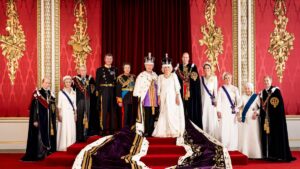
In this article we have discussed about monarchy in UK in FAQ format and also the questions which can be asked in UPSC CSE.
What is the context?
- The crowning of King Charles III of the U.K. has sparked important discussions regarding the monarchy’s relevance in the 21st century.
- For a considerable period, the U.K. and the Commonwealth realms have been undergoing substantial societal, political, and cultural changes.
What makes the U.K. monarchy unique?
The U.K. monarchy is unique because the monarch is both the Head of State in the U.K. and the Head of the Commonwealth, giving it both local and global relevance.
Can the U.K. monarchy survive the changes of the 21st century?
It’s hard to predict if the U.K. monarchy will survive because it is difficult to remove European monarchies. However, only 22% of people would vote for a republic, so change is unlikely soon. Scotland and Northern Ireland are growing more republican, but it may not lead to a split.
What could demographic changes mean for the U.K. monarchy?
Demographic changes may be bad for the monarchy. This is because most people under 50 are either indifferent or hostile to the coronation. Moreover, people are increasingly against inequality in Britain. The monarchy’s extravagant lifestyle and costs may not be popular, especially as more people are becoming poor.
What role does the monarchy play in the British establishment?
The monarchy is very important to the British establishment, as the honours system still matters to the decision makers. There is a growing gap between that elite and the mass of the population. The monarchy constantly has to reinvent itself. After 70 years of a monarch on the throne, there isn’t a modern playbook to go back to. Even though the nature of the media, British society, and the Commonwealth have changed so much.
What are the main challenges to the idea of monarchy, and why are monarchies under fire?
One of the key challenges to the idea of monarchy is the notion that all human beings are created equal. However, even in democratic capitalist societies, elites exist, and are often required to justify their position. Monarchies are under fire mainly because of their hereditary nature, which makes it harder to justify their continuance. The contradiction of having a monarchy in a formally democratic and capitalist society is uncomfortable for many people.
Is the hereditary nature of monarchy the only reason for its unpopularity?
While the hereditary nature of monarchy is a major issue, it is not the only reason for its unpopularity. People feel uncomfortable because Britain claims to be democratic and capitalist, but the monarchy is based on bloodline. Some other European countries like the Netherlands and Sweden have monarchies too, but they are more equal than the UK.
Can becoming a republic solve fundamental inequality?
Becoming a republic alone cannot solve fundamental inequality. There is actually no programme that a group like Republic has put forward that will address fundamental inequality. The plutocratic nature of a republic might not change at all, so it is possible to have an elected head of state and still have tremendous inequality. Groups such as Republic envision nothing more than having elections for a symbolic head of state.
What are some examples of countries that have successfully become republics?
The Republic of Ireland is a successful example of a country that has become a republic, with outstanding unifying figures such as Michael Higgins, Mary McAleese, and Mary Robinson. However, it is important to note that the Republic of Ireland has always been a different sort of society from England. The Commonwealth realms are also considering becoming republics, with Barbados being the latest to make the change. However, the process of becoming a republic can be complicated and bogged down in broader questions about what the constitution will look like.
What impact has COVID-19 and the cost-of-living crisis had on the monarchy’s popularity among the middle class
- The economic upheavals caused by COVID-19: The economic upheavals caused by COVID-19 and lockdowns, as well as the cost-of-living crisis in many countries linked to trade disruptions and Russia’s invasion of Ukraine, have led to a growing sense of economic distress among the middle class.
- In this context, the continuance of monarchical power appears more untenable. Even people who are otherwise likely to celebrate are remaining muted, indicating a lack of enthusiasm around the coronation. As people become poorer, it becomes harder to celebrate people at the top being very wealthy and gaining even more wealth and power.
- Threats: Younger parts of the population, who were more enthusiastic Europeans, may feel that the monarchy has betrayed their future and may take out their anger on them, posing a danger. The danger is that this may lead to greater division in British society. However, opinion towards the monarchy now seems to be shifting, although there is still a gap between the younger generation’s interest in investigative journalism and the vast majority of the billionaire-owned British media that has a stake in entrenching the monarchical system and inequality.
